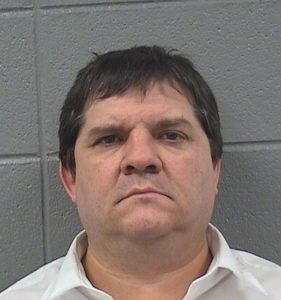Former Concordia coach files appeal of sex assault conviction
February 25, 2019Former Concordia baseball coach Spiro Lempesis has filed an appeal of his December 2017 conviction for criminal sexual assault on former university baseball player Anthony Collaro when he was a minor.
The appeal asks that Lempsis be either acquitted of the charges, or be granted a new trial.
As of Feb. 15, the State’s Attorney’s office had not filed a response to Lempesis’ allegations with the appellate court.
Lempesis was found guilty on three of four felony counts Dec. 5 after a bench trial before Associate Cook County Judge Gregory R. Ginex. He was sentenced to 10½ years in prison and has served more than 13 months of that sentence.
According to the Illinois State Bar Association website, Judge Ginex retired Jan. 26, 2018
Lempesis’ attorney Blake Horowitz presented five issues for the 1st District Illinois Appeals to consider, including pretrial discovery irregularities, due process violations, reliance by the court on evidence “outside the record” to reach a verdict, that the judge allowed expert testimony to be given by an unqualified lay witness (Collaro), and that the state failed to prove Lempesis’ guilt beyond a reasonable doubt.
Chief among Horowitz’s allegations are that no evidence was ever presented at trial showing that Lempesis’ sexual encounters with Collaro occurred prior to Collaro turning 18 years old. Horowitz, who filed numerous pretrial objections that were overruled by Ginex, hammered away in his appeal at what he characterized as a complete lack of any evidence that Lempesis ever had sexual contact with Collaro prior to him turning 18 and enrolling at Concordia.
No witness besides Collaro himself testified that Lempesis molested him as a minor, Horowitz said. In fact, two witnesses called to testify stated that Collaro explicitly told them his sexual activity with Lempesis did not occur before he enrolled at Concordia as an 18-year-old.
Horowitz argues that Ginex committed “reversible error” when he improperly limited the scope of Horowitz’s challenge to Collaro’s testimony. Those rulings, Horowitz said, prevented him from gathering information in discovery that would have allowed him to identify facts, documents and witnesses that would have enabled him to craft a much stronger defense of Lempesis, which effectively deprived Lempesis of his Constitutional right to due process,
“The full Concordia report would have been material and favorable to the defense,” Horowitz said.
Horowitz also contends that the judge violated Lempesis’ Sixth Amendment rights when he denied his lawyer the ability to question Collaro on his civil lawsuit against Lempesis and Concordia.
“The main theory of the defense was that Collaro fabricated the allegations against (Lempesis) … to increase his chances of winning the civil case he filed against Concordia and the defendant,” Horowitz said.
He also accused the Cook County State’s Attorney of improperly attempting to “poison the tryer of fact” when it filed a brief asking Ginex to review a five-hour long video showing, in part, Lempesis engaged in sexual activity with Collaro while Collaro was a baseball player at Concordia. Though Ginex ruled the video inadmissible, Horowitz contends it played a part in Ginex finding Lempesis guilty of molesting Collaro as a minor.
Finally, Horowiz argues that Ginex improperly delegated his judicial authority to both Collaro’s attorney in the civil suit against Concordia, Gina DeBoni, and witness Patrick Collins, who conducted a months-long investigation into Lempesis for Concordia. Rather than rule on statements made by Collaro that were arguably inconsistent, Ginex directed Collins and Deboni to make known to him any evidence of “inconsistent statements” made by Collaro.
“Collins and DeBoni, Horowitz argued, “(were) not the presiding judge, associated in anyway with the State’s Attorney’s Office, a party to the case or familiar with the criminal charges.”
In ordering both Collins and DeBoni to conduct their own assessment of Collaro’s statement, Horowitz said, the judge “removed the materials from the procedural safeguard of Brady v Maryland.”
That law requires prosecutors to turn over to the defense all evidence that might help the defense. That, Horowitz said, “left (Lempesis) without an avenue to discover exculpatory information that the Assistant State’s Attorney would normally have a duty to turn over.”
In several phone interviews over the past six months from the Robinson Correctional Center in Southern Illinois, Lempesis focused repeatedly on what he called a total lack of any evidence to support Collaro’s contention that he sexually molested him while a minor.
Lempesis has admitted that he behaved inappropriately and “deserved to be fired,” but denied he did anything illegal while head coach, and insisted he was “absolutely not” a pedophile.
In a telephone interview Feb. 20, Lempesis said he’s resigned to a long wait to see how the appellate court rules on the issues his lawyer raised. He said it’s his hope that the justices “will look at the evidence and know that I am not guilty beyond a reasonable doubt.”
“I’m not 50 percent, I’m not 75 percent, I’m 100 percent not guilty.”
“I have mixed emotions,” Lempesis said “I believe the appeal is strong. I want to compliment my attorneys for the job they did on this appeal.”
“(But) the fact that I’m in prison, I have no faith in a system that’s not supposed to convict an innocent man.”








